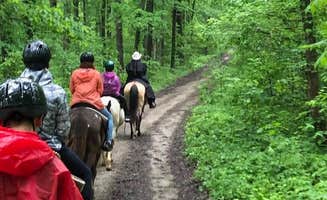Mammoth Cave Horse Camp provides equestrians direct access to over 60 miles of trails through Mammoth Cave National Park. Located about 2 hours northeast of Westmoreland, Tennessee, this campground sits within Kentucky's diverse karst region where limestone topography creates a mix of ridges, valleys, and sinkholes. The moderate climate allows for year-round trail riding with seasonal variations in trail conditions between May and October.
What to do
Trail riding through the backcountry: At Maple Springs Campground, riders can access multiple trail networks directly from camp. "Direct trail access" notes camper Shelly S., who adds, "The campground is well spaced out, horse trailer and horse friendly, pretty good shade."
Cave tours between rides: Many horse campgrounds provide easy access to Mammoth Cave tours. "The cave is very big and cool. Reserve the all day guided tour with crawling about in small spaces for the best experience. Make sure your boots have enough tread or you won't be allowed to do the tour!" advises Dan X.
Hiking with or without horses: The extensive trail system allows for exploring on foot when not riding. "There are trails that leave the campground. Fireflies are great at night. Frogs are singing in the evening. Tons of trees and shade," mentions Veronica S. about camping experiences in the area.
What campers like
Wildlife encounters: The natural setting brings regular wildlife sightings near Mammoth Cave Campground. "Very clean & quiet! The wildlife are very friendly!" says Gloria J., who notes "Deer & turkey walk thru ur campsite!"
Community atmosphere: The horse camping community typically shares a supportive environment. "People here were kind and trustworthy. People were charging their power stations unattended in the bathrooms. We were given extra wood by our neighbors," reports Veronica S.
Access to water recreation: While primarily focused on equestrian activities, Dale Hollow Lake - Primitive Camping offers additional recreation. "We took a pontoon boat out to Kemper Flats on Dale Hollow lake for a few days relaxing fishing. Primitive site, island with a porta toilet. Camp right on the side of the lake, very quiet and peaceful," shares Andy K.
What you should know
Reservation requirements: Most established horse campgrounds fill quickly during peak season. "Call in advance for reservations as most of their events book fast and sell out!" advises Heather K. about Double J Stables and Campground.
Bring your own corrals: Some campgrounds require portable containment systems. "The campground has poles to tie your horses, a fire ring, tent pad and lantern hooks. Pretty easy to find seasoned wood to burn," notes Shelly S. about backcountry options.
Tick prevention: Spring and summer months bring increased tick activity. "The only downside to the entire trip is that the park is infested with seed ticks and deer ticks. I was pulling ticks off of every inch of me even though I was coated in several layers of hardcore bug spray," cautions Carrie J.
Water availability: Water access varies by location. For backcountry sites like Turnhole Backcountry Campsite, "water is hard to come by here, and hiking it in may be your best bet. The river is at least 1/2 mile away, through extremely dense brush, and the banks are not easy to access," warns Mandy C.
Tips for camping with families
Choose camps with amenities: For families new to horse camping, select locations with more facilities. "They have a playground for younger kids to play on. While we were there the owners were fundraising so they could improve it further," shares Heather K. about family-friendly options.
Book cave tours early: Popular activities fill quickly during peak season. "You've got to make a reservation for tours - be warned, they fill up quickly. I recommend making a reservation at least a week before in the busy season," advises Erin H.
Plan for weather contingencies: The region experiences varied weather patterns. "The great thing about this park is that the main attraction is always the same comfortable temp and weather year round - and you can spend a dry several hours while you avoid the rain spurts outside," says Erin H.
Tips from RVers
Check access routes: Some horse camps have limited access for larger rigs. "Watch the approach since you could head into the truck stop - stay to the right and you will be ok," advises Charlie M. about Dad's Bluegrass Campground, a potential staging area for horse activities.
Call ahead for road status: Ferry crossings can affect access to some horse camping areas. "The Green River Ferry seems to be non-operational a lot. Call the hotline the day of your drive in to see which route you should take: 270-758-2166," recommends Mandy C.
Site layout considerations: Trailer sites require specific setups. "My site was slightly uphill where I had to park to reach the water hookup. The water hookup is very close to the ground and leaked for me. Made it very hard to connect the hose and pressure regulator," reports Jon P. about RV site challenges.



